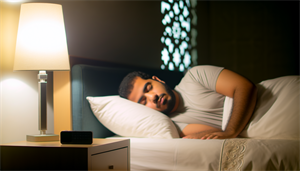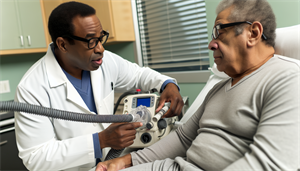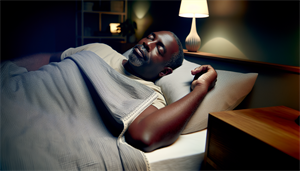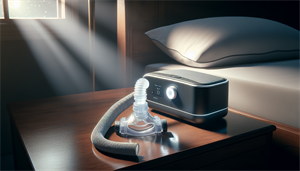If your husband’s snoring persists even with CPAP therapy, you’re undoubtedly seeking answers. Commonly used for obstructive sleep apnea, a CPAP machine should typically prevent the situations that lead to snoring. Yet, here you are, searching for ‘why is my husband still snoring with CPAP.’
It’s a confusing and frustrating situation, but not uncommon. In the paragraphs to come, we’ll delve deep into potential reasons like mask fit problems, pressure setting issues, or even lifestyle factors that can undermine the effectiveness of CPAP therapy. Understanding these can help you and your husband find the quiet night’s sleep you’re longing for.
Key Takeaways
-
CPAP is a commonly used treatment for sleep apnea that aids in snore prevention, but persistent snoring while using CPAP can indicate issues with equipment or air pressure adjustments.
-
Possible reasons for snoring despite CPAP usage include inadequate air pressure, ill-fitting CPAP masks, and lifestyle or health changes requiring therapy adjustments.
-
Proactive efforts to customize CPAP therapy include adjusting air pressure settings, selecting the right mask, managing nasal congestion, and maintaining equipment regularly; if problems persist, a consultation with a sleep specialist is essential.
Understanding CPAP and Its Role in Preventing Snoring

CPAP, which stands for Continuous Positive Airway Pressure, is a popular treatment for obstructive sleep apnea. The therapy involves a CPAP machine that delivers a steady stream of pressurized air through a mask into the airway. This pressurized air prevents the soft palate, uvula, and tongue from collapsing into the airway, reducing the vibration that causes snoring. By keeping the throat open, CPAP therapy reduces breathing events, prevents apneic episodes, and ultimately, helps with cpap stop snoring.
You might wonder about the necessity of such an intervention to deal with snoring. Snoring is not just an annoying nightly ritual; it has potential health implications too. Persistent snoring may lead to sleep disruptions resulting in daytime sleepiness, irritability, and even poorer cognitive function. In some cases, it may lead to more serious conditions such as hypertension, diabetes, strokes, heart attacks, or heart failure. Thus, finding ways to stop snoring is not just about preserving domestic peace; it’s about safeguarding health and wellbeing.
Nevertheless, if snoring persists while using CPAP, it may indicate an issue with the equipment or a need for additional evaluation. If you’ve been wondering, “why is my husband still snoring with CPAP?” - this blog post aims to uncover the reasons behind persistent snoring despite CPAP therapy and guide you towards better sleep.
Uncovering the Reasons Behind Persistent Snoring Despite CPAP Use

Despite following all the instructions properly, You’ve invested in a CPAP machine, followed the doctor’s instructions, and your husband has been using it religiously every night. yet the snoring continues. What could be the reason? There are several reasons why someone might still be snoring despite using a CPAP machine. The primary factors include inadequate air pressure, complications with the CPAP mask fit, and certain lifestyle and health changes.
Each factor plays a significant role in the efficacy of CPAP therapy. Fortunately, these are not insurmountable obstacles. By understanding and addressing these issues, you can help your partner achieve a snore-free, restful night’s sleep. We’ll examine each of these factors closely.
Inadequate CPAP Air Pressure
First up is the issue of inadequate air pressure. Insufficient air pressure from the CPAP machine can result in ineffective therapy and persistent snoring. CPAP therapy works by delivering a steady flow of air to keep the upper airway open during sleep. If this air pressure is too low, it may not be enough to prevent the airway from collapsing, leading to snoring. To ensure the effectiveness of the treatment, it’s essential to find the right balance of air pressure that will help with cpap stop snoring.
The recommended air pressure for CPAP machines varies, typically ranging between 4 cmH2O and 20 cmH2O. The most frequently used pressure setting is 10 cmH2O, although individual requirements may vary. Should the pressure setting on your CPAP machine appear insufficient, seeking advice from a sleep specialist or your primary care physician is necessary. They can help adjust the pressure settings to ensure that the CPAP machine effectively stops snoring.
Complications with CPAP Mask Fit
Next in line is the issue of mask fit. A poorly fitting mask can lead to air leaks, which can reduce the effectiveness of CPAP therapy and result in persistent snoring. The mask is an important component of the therapy, providing a seal that allows the pressurized air to be delivered effectively.
If you believe an ill-fitting mask is causing the continued snoring, it’s crucial to rectify this issue quickly. There are various techniques you can use to properly adjust the mask and prevent leaks. If these adjustments do not solve the issue, it may be time to consider a different type or size of mask. A healthcare provider or CPAP provider can provide further guidance in finding a suitable mask that will ensure a good seal and comfortable fit. Some techniques to adjust the mask include:
-
Tightening the straps to ensure a secure fit
-
Adjusting the position of the mask on your face
-
Trying different sizes or styles of masks
-
Using mask liners or cushions to improve comfort and seal
By following these tips and seeking professional advice if needed, you can find a mask that fits properly and effectively treats your snoring.
Lifestyle and Health Changes Affecting CPAP Efficacy
Finally, let’s talk about lifestyle and health changes. Changes such as weight gain or loss can affect the efficacy of CPAP therapy. For instance, weight gain can potentially require adjustments in therapy settings, while weight loss can improve sleep apnea, enhancing the efficacy of CPAP treatment.
Furthermore, lifestyle modifications such as:
-
increasing physical activity
-
quitting smoking
-
reducing alcohol and tobacco consumption
-
adopting better sleep practices
can also impact the effectiveness of CPAP therapy. These alterations may result in changes in the necessary CPAP pressure or the need for further therapy adjustments. Regular consultations with your healthcare provider or sleep specialist can ensure that your CPAP therapy is tailored to your current health status and lifestyle.
Tailoring CPAP Therapy for Better Sleep
Having identified possible reasons for continued snoring despite CPAP usage, it’s time to examine how we can customize CPAP therapy for improved sleep. There are three key areas to focus on: adjusting CPAP pressure settings, selecting the perfect mask, and addressing mouth breathing during sleep. Each of these areas plays a significant role in enhancing the effectiveness of CPAP therapy and ensuring a good night’s sleep.
By making these adjustments, you can ensure that your husband’s CPAP therapy is as effective as possible, helping to prevent snoring and improve sleep quality. Let’s examine each of these areas closely.
Adjusting CPAP Pressure Settings
As previously noted, incorrect pressure settings can compromise sleep quality and treatment efficacy, resulting in ongoing snoring. Ensuring that pressure settings are accurately calibrated is paramount to optimize the effectiveness of CPAP therapy.
One crucial thing to remember is that individuals should not attempt to adjust their CPAP pressure on their own. If there are issues with pressure levels, it is advisable to seek assistance from a healthcare professional or CPAP provider. They have the knowledge and expertise to adjust the pressure settings correctly, ensuring that you receive the most effective therapy for enhancing sleep quality.
Selecting the Perfect Mask for Comfortable Nights
Selecting the right mask is a vital part of successful CPAP therapy. The perfect mask for you depends on your sleeping style, comfort preferences, and specific requirements. There are three main types of CPAP masks: full face masks, nasal masks, and nasal pillow masks. Each has its advantages and disadvantages.
Full face masks are beneficial for patients who breathe through their mouths, especially during congestion. However, they can be cumbersome and uncomfortable. A nasal mask provides comfortable pressure delivery and better tolerance, while nasal pillow masks feature a minimalist design with less headgear. However, nasal masks are not suitable for mouth breathers. Consult with your healthcare provider to find a mask that best suits your needs.
Addressing Mouth Breathing During Sleep
Mouth breathing is a common occurrence among CPAP users. However, it can compromise the airway anatomy and diminish the effectiveness of breathing, whether with or without a CPAP machine. Additionally, mouth breathing during CPAP therapy can exacerbate dry mouth symptoms.
If you or your partner is a mouth breather, consider using a full-face mask or chin strap to help ensure proper oxygen intake during CPAP usage. These solutions can help keep the mouth closed during sleep, ensuring that the pressurized air from the CPAP machine is delivered effectively.
Proactive Steps to Enhance CPAP Therapy
In addition to making necessary adjustments to CPAP therapy, there are proactive steps you can take to enhance its effectiveness. These include exploring alternative sleeping positions, managing nasal congestion, and regular CPAP equipment maintenance. By implementing these steps, you can be confident in your efforts to maximize the advantages of CPAP therapy and minimize snoring.
We’ll examine each of these steps closely.
Exploring Alternative Sleeping Positions

Your sleeping position can have a significant impact on the effectiveness of your CPAP therapy. Sleeping on your side, for example, can help prevent the upper airway from collapsing due to gravity, thus contributing to improved effectiveness of CPAP therapy and a reduced likelihood of snoring.
The recommended sleep position for CPAP users includes sleeping with the upper body at an incline, avoiding sleeping flat on the back, and adopting a side sleeping position. These adjustments to your sleeping position can potentially reduce the likelihood of airway obstructions and enhance sleep apnea symptoms for CPAP users.
Managing Nasal Congestion for Clearer Airways

Nasal congestion can affect CPAP therapy by inducing congestion in individuals with recurrent sinus problems, resulting in unwanted nasal symptoms. Conversely, for individuals with mild congestion, CPAP may aid in clearing mucus from the nasal passage.
There are various home remedies to alleviate nasal congestion, including the use of nasal saline spray, application of CPAP moisture cream, and the use of heated tubing. Additionally, addressing the underlying causes of congestion is beneficial.
A humidifier can also be a helpful addition to your CPAP therapy, as it introduces moisture and humidity to the nasal passages, breaking up mucus and alleviating nasal congestion.
The Importance of Regular CPAP Equipment Maintenance
Maintaining your CPAP equipment regularly is vital for its peak performance. Ensuring that your CPAP equipment is clean and well-maintained contributes to the machine’s ability to effectively keep the airway open during sleep. This, in turn, reduces or eliminates the sound of snoring, resulting in improved sleep quality and reduced snoring.
The optimal cleaning procedure for CPAP equipment involves using mild soap and warm water to clean all components, ensuring they are completely air-dried before reassembling the machine. Regularly replacing your CPAP mask and hose is also recommended to uphold equipment efficiency and ensure the optimal performance of the CPAP therapy.
When to Consult a Sleep Specialist
If, despite your best efforts, the snoring continues for more than three months, significantly impacts your daily life, or if you experience symptoms such as excessive daytime sleepiness and suspected obstructive sleep apnea (OSA), it’s advisable to seek the expertise of a sleep specialist. Additionally, if you’re uncertain about the accuracy of your CPAP settings and believe a titration study might be needed for adjustments, consulting a sleep specialist is advised.
Sleep specialists are highly trained physicians with extensive knowledge of sleep disorders. They are capable of:
-
Diagnosing sleep apnea and snoring
-
Providing suitable treatments after conducting comprehensive evaluations, which may involve personalized therapeutic interventions
-
Administering diagnostic tests such as polysomnography or a sleep study in cases of persistent snoring despite CPAP therapy.
Summary
We’ve journeyed through the world of CPAP therapy, uncovering the reasons behind persistent snoring despite its use, and explored ways to tailor and enhance this therapy for better sleep. We’ve also touched on the importance of consulting a sleep specialist when necessary. Remember, snoring is not just an annoying habit; it can be a sign of underlying health issues like sleep apnea. Therefore, it’s important to take persistent snoring seriously and explore all possible solutions.
Remember, the goal of CPAP therapy is not just to stop snoring but to improve overall sleep quality and health. With the right adjustments, proactive steps, and professional guidance, you can ensure that you or your partner get the most out of CPAP therapy. Here’s to a future of peaceful, snore-free nights!
Frequently Asked Questions
Is it normal to still snore with a CPAP machine?
It is possible to continue snoring while using a CPAP machine, and this could be due to issues such as mask leaking or improper fitting. It's important to address these issues to ensure effective sleep therapy.
Can you still have sleep apnea with a CPAP machine?
Yes, it is possible to still have sleep apnea while using a CPAP machine, as some people may still experience symptoms or unwanted side effects despite using the machine. Adjustments such as trying a different mask or changing pressure settings may be necessary.
What is the treatment for snoring CPAP?
The standard treatment for snoring related to sleep apnea is continuous positive airway pressure (CPAP) therapy, which uses a mask to support the airway during sleep. In extreme cases, surgery may be considered as an option.
Why is my husbands CPAP so loud?
It's important to check the CPAP tubing and ensure it's properly connected to prevent air leaks that could result in whistling noises. Make sure the hose is securely attached to both the CPAP machine and the mask.
Related health topics?
Exploring various health topics is essential for maintaining overall well-being.

